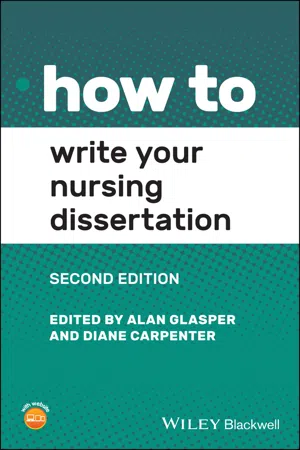
How to Write Your Nursing Dissertation
Alan Glasper, Diane Carpenter, Alan Glasper, Diane Carpenter
- English
- ePUB (adapté aux mobiles)
- Disponible sur iOS et Android
How to Write Your Nursing Dissertation
Alan Glasper, Diane Carpenter, Alan Glasper, Diane Carpenter
À propos de ce livre
how to write your nursing dissertation
How to Write Your Nursing Dissertation provides nursing and healthcare students with authoritative information on developing, writing, and presenting an evidence-based practice healthcare dissertation, project or evidence-informed decision-making assignment. Written by experienced healthcare professionals, this comprehensive textbook offers clear and straightforward guidance on sourcing, accessing, and critically appraising evidence, helping students develop their clinical research and writing skills. The authors address the common difficulties encountered throughout the process of writing a dissertation, project or evidence-informed decision-making assignment, and offer expert tips and practical advice for managing time, developing study skills, interpreting statistics, publishing aspects of the work in a journal or at a conference, and more.
Now in its second edition, this bestselling guide presents relatable and engaging scenarios to illustrate the setting of standards, explore legal and ethical frameworks, examine auditing and benchmarking, and demonstrate how evidence is applied to real-world problems. Covering the entire dissertation, project or evidence-informed decision-making assignment process from a nursing and healthcare perspective, this innovative textbook:
- Helps students develop and appropriately answer a clear dissertation, project or evidence-informed decision-making assignment
- Addresses the fundamental aspects of evidence-based practice in an accessible and readable style
- Features new and updated content on mini dissertations, final assessments, and evidence-informed decision-making projects that many healthcare institutions now require
- Presents up-to-date information that meets the needs of new healthcare roles, such as the Nursing Associate and Healthcare Assistant
- Includes access to a companion website containing downloadable information, an unabridged dissertation sample, and links to additional resources
How to Write Your Nursing Dissertation is a must-have guide for nursing and healthcare students, trainees, other healthcare students required to complete an evidence-based practice project, and anyone looking to strengthen their critical appraisal and assignment writing skills.
Foire aux questions
Informations
Section 1
Starting your dissertation journey
Chapter 1
Starting the journey of your final‐year project
What is a final‐year project?
Table des matières
- Cover
- Table of Contents
- Title Page
- Copyright Page
- List of Contributors
- Foreword
- Preface
- About the companion website
- The Scenarios
- Section 1: Starting your dissertation journey
- Section 2: Sourcing and accessing evidence for your dissertation
- Section 3: Developing your healthcare/ evidence‐based practice dissertation
- Section 4: Preparing to use research evidence in your dissertation
- Section 5: Critically appraising evidence
- Section 6: Taking your dissertation further: disseminating evidence, knowledge transfer; writing as a professional skill
- Index
- End User License Agreement